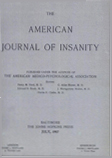Abstract
Data are presented dealing with the accuracy of the Psychopathic Hospital diagnoses on 419 patients. The Psychopathic diagnosis was determined within 10 days in all but a few. In a few cases we had more time, up to a month, to study the case. The cases have been followed for a year to a year and a half.
The figures are based upon the diagnoses made at 11 state institutions, McLean Hospital, and a small group of private sanitaria, to which our patients were committed. Most cases have been reported twice, and in a few instances three times.
The general error in diagnosis is established at 23.0 per cent (omitting the unclassified cases from consideration).
This error is not evenly distributed. Our greatest accuracy is in epilepsy (100 per cent) ; next in neurosyphilis (92.3 per cent); then dementia præcox (85.2 per cent.) Of the larger groups we are least accurate in arteriosclerotic psychosis (54.5 per cent) ; then in Korsakow's (63.6 per cent) ; then the acute alcoholic psychoses (66.6 per cent) ; then manic-depressive and chronic alcohol psychoses (70 per cent).
Many cases have had more than one diagnosis from the other institutions.
We diagnosed dementia præcox in 183 cases: diagnosis changed in 28, of which four were left unclassified. Twenty-eight cases were added to this group.
Of the 24 definite changes, two were unclassified paranoid. In three cases our record seems clearly that of a manic-depressive; in one, manic-depressive+some unusual symptoms. In these four cases there should have been no error. One case of late katatonia should probably not be called manic-depressive. In three cases, our record is that of dementia præcox, and the outcome is not yet certain. In four cases our diagnosis seems symptomatically correct, but not verified by outcome. In three cases I believe neither diagnosis to be correct, and in four more I am fairly certain the final diagnosis is incorrect, but have no exact opinion as to correct diagnosis. In another case the accuracy of the history must decide: in two, I can form no opinion.
The diagnosis was changed in 18 of 60 cases called manicdepressive at the Psychopathic, and 21 cases were added. One case is left unclassed.
Of the 17 definite changes, my own opinion is as follows: That in eight cases, according to symptomatology and outcome, the Psychopathic diagnosis is probably correct; in four cases the Psychopathic record is such that a diagnosis of manic-depressive should not have been made, and the other institution is correct; in three, the second diagnosis is probably correct, although the Psychopathic diagnosis may eventually be proven.
Of the three errors made in the diagnosis of 39 cases of neurosyphilis, two should not have been made, since our record clearly agrees with the other institution's diagnosis. In the third case we recognized the presence of neurosyphilis, which the other institution did not.
Of the four errors in the diagnosis of 12 cases of the acute alcoholic group, I should doubt the "recovered" dementia præcox; believe that acute alcoholic hallucinosis is a better diagnosis than "toxic insanity"; and believe that a recovered manic-depressive showing "blúnting due to the use of alcohol" probably had an alcoholic psychosis.
Two of the three errors in the chronic alcoholic group are really not errors, since we did not regard them as sufficiently deteriorated to commit as insane. The other case is a frank error.
In the arteriosclerotic group, changes to senile dementia occur three times. Such changes depend largely upon interpretation of findings. In four of the 10 cases in which diagnosis was changed, the second diagnosis seems to be erroneous, and in two more the diagnosis is less exact than ours, while one case is left unclassified.
The four changes in the diagnosis of Korsakow's syndrome represent: I, A very difficult case in which we were none too sure of the diagnosis; 2, an end state (dementia); 3, a "toxic" psychosis; 4, alcoholic hallucinosis.
The paranoid conditions are often very difficult of exact diagnosis. Four of the six changes represent differences in diagnostic ideas; one more was caused by further developments in the course of the disease.
Therefore, in 396 cases diagnosticated, there were 91 changes. Of these nine are left unclassed, and the Psychopathic diagnosis may eventually be proven correct. Of the remaining 82, 10 are cases in which, from the Psychopathic record, no error should have been made. In 21 more the Psychopathic diagnosis is probably correct. Three cases classed as errors are not really so. In three cases probably neither diagnosis is correct. So, if we exclude the cases left unclassed; the cases in which we are probably correct and those in which there was really no error, we are left, with a total of 58 frank errors among 396 cases, or 14.6 percent. This raises the question: "What is the error in psychiatric diagnosis at large?" which can only be answered by each institution critically analyzing its own diagnoses and errors. Compilation of such figures from several institutions would be of extreme value.
It appears more and more strongly that accurate observation and intelligent interpretation are the fudamentals of correct diagnosis, and that there is need of a unification of diagnostic standards.

